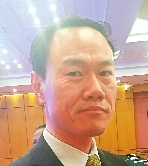
Ieng Srong
Zhang Qian
zhqcindy@163.com
A year after UNESCO published a recommendation on museums, researchers and museum directors gathered in Shenzhen yesterday to discuss how it had been implemented in their respective countries and regions.
It was the first time for UNESCO to summon such a seminar for representatives from its member states to brief and discuss the recommendation and its implementation, said Ieng Srong, a UNESCO representative and host for yesterday’s seminar at Wuzhou Guest House.
Speakers from China, Tunisia, the Philippines, Barbados, Russia and France talked about how their country, region or a particular museum had performed while protecting and promoting museums and their collections.
Each member state and region had been faced with different challenges. For instance, Jeremy Barns, director of the National Museum of the Philippines, said they do not have legislative frameworks or a particular government body to oversee cultural heritage preservation.
Without relevant laws, museums in the Philippines have to follow common rules agreed upon by most of the museums and the sole national museum is shouldering the responsibility of promoting and preserving their cultural heritage.
In the Caribbean, the implementation of UNESCO’s recommendation also suffers setbacks and challenges, according to Alissandra Cummins, the Director of Barbados Museum & Historical Society (BMHS).
Cummins said the colonial history of many regions in the Caribbean undermined their status in science, arts and cultural heritage. Luckily, many member states and countries are making efforts to promote museums through multi-level partnerships and cooperation with other regions and countries, said Cummins.
In comparison, museums in China and Brazil enjoy larger support from the government, which was an essential factor for museums implementing the recommendation.
Tian Kai, director of the Henan Museum, introduced how the museum had performed its educational role in the region by incorporating local schools and students with abundant resources from the museum. It had set up both on-site and online “History Class” programs for local students. The director also mentioned that governments of all levels had shown great support by providing legislative frameworks and doctrines for museums in China.
“We can see that for China and Brazil for example, the decision to promote culture in the development agenda comes from very high authorities in the countries, so there is a need for the governments from the member states to integrate these priorities into the decision-making process,” said Srong after hearing all of the presentations.
Another recommendation called the Shenzhen Declaration is expected to be announced today.
Editor: Jane Chen